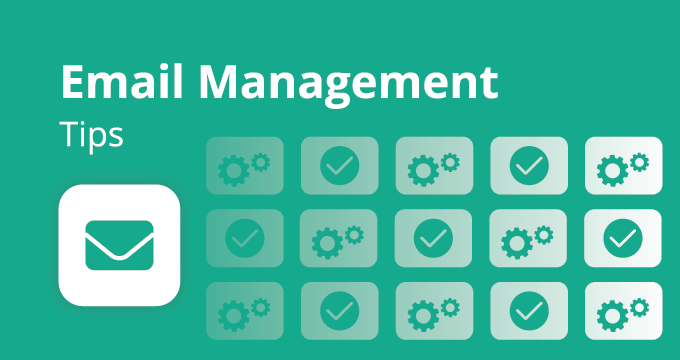Since its inception in 1971, email has revolutionized business communication and remains crucial for daily operations.
The sheer volume of messages exchanged has fueled the growth of industries focused on email storage and management. In their recent Email Statistics 2023-2027 report, The Radicati Group affirmed that “email continues to be an essential part of daily business and consumer communication. With an estimated 4.6 billion people using email in 2025, this number is projected to exceed 4.8 billion by 2027.
In this article, we’ll discuss:
- Important email functions
- Reasons why email storage management is so challenging
- Email storage management and optimization tips
What Are the Main Functions of Email?
Email is used to discuss business decisions, share documents, and act as written evidence in disputes. Discussing business decisions
A vast majority of senior staff members and C-level executives still consider email to be the primary communication channel for work. Most business decisions continue to be communicated through email, especially when it’s important to reach multiple recipients.
A major downside of email lies in its volume, as messages accumulate fast.
Anyone who’s ever conducted an email conversation with more than one person knows how quickly the volume of email messages can multiply and how complex email threads can be.
Sharing documents
Email is the most popular method for document sharing.
Whether it’s a contract to sign, a monthly report, or a valuable business document, you’ll most probably send it as an email attachment. A disadvantage is that attachments can be bulky, which quickly results in clogged email servers.
To avoid overloading your systems, it’s mandatory to have some kind of email storage management strategy in place.
Evidence in court
Beyond communication, email has become a business record. This particularly applies to regulated industries in which compliance with laws like the Sarbanes-Oxley Act (SOX), FINRA, HIPAA, and FOIA mandates strict retention of email and other electronic communications. Failure to produce such records in a legal or audit context can result in severe penalties.
These days, many business decisions are confirmed via email. This means email messages have become official documents in their own right.
Effective email storage management is vital in ensuring that these documents don’t get deleted or shared inadvertently and that they are held securely.
Moreover, internal and external auditors and regulators have the right to request your organization’s email history in case there’s a pending lawsuit or charges of fraud, embezzlement, or employee misconduct.
In such cases, your litigation response needs to be quick. Without a proper email storage management strategy or a dedicated email archiving solution, companies are forced to extract data manually, which can take weeks and cost a lot — reviewing documents accounts for 80% of litigation spend, which translates to $42 billion annually.
What Is the Definition of Email Storage Management?
Email storage management is a process in which organizations implement strategies, policies, best practices and tech solutions to control and manage high volumes of email and improve the performance of email servers
Some of the common ways to manage email storage are:
- Email quotas
- Attachment limits
- Spam filters
- Stubbing
- Deduplication, single instance storage and compression features
- Email archiving
3 Ways to Improve Email Storage Management
All this makes effective inbox management increasingly harder.
Popular approaches like the 1-hour rule (setting aside one hour a day to handle all emails), inbox zero (keeping your inbox completely or nearly empty), and the 20/80 rule (focusing only on the 20% of emails that bring the most value) aim to improve productivity by minimizing time spent on email.
While these tactics help reduce inbox clutter, they depend heavily on individual judgment. Most people hit “send” and “delete” without being aware of the storage issues or possible repercussions.
This introduces compliance risks: employees might delete emails that seem unimportant but are legally required to be retained.
In regulated industries, where strict retention rules apply, relying solely on personal inbox strategies can lead to serious gaps in recordkeeping and expose the organization to legal and financial consequences.
That’s why email storage management needs to go beyond personal efficiency and include organization-wide policies and systems that preserve all essential communications.
Here are the top 3 email management tips from Jatheon’s IT team:
1. Get your attachments right
The most common emailing mistake is clicking “reply all” when you meant to click “reply.” This is closely followed by the”‘please find attached” email with no attachment. This might just be a minor embarrassment for you, but it can create serious email storage management issues.
The follow-up you’re forced to send creates extra email traffic and regulatory or ediscovery problems. Scanning an old tape for a particular email is a lot more difficult when important attachments are included.
2. Limit forwarding and pointless email threads
Don’t use email to forward memes or links to X (formerly Twitter) posts. Most staff hate being included in these mails, and they also clog up email storage management systems with spammy content.
Remember that the most important business emails are those that relay or generate key decisions.
Conversational or spammy internal emails add little value to your business and put undue pressure on your email servers.
A strict email usage policy should help to reduce the number of empty emails and help you keep a trim email storage management system.
3. Try to see the big picture
One of the popular ways to slim down your email load is to apply email quotas.
A lot of businesses limit inbox size to ensure that employees retain important emails and delete the rest. However, this can be a useful and sound tactic in theory, but it tends to be counterproductive in practice.
This is because this tactic has one major flaw — it’s prone to human error. By adopting it, organizations rely on an individual employee’s judgment to decide (usually when under pressure because their mailbox is full) which emails to keep and which to delete. This can result in a less useful email system on the whole and, in a worst-case scenario, leave you open to serious legal issues.
Effective email storage management means devising a comprehensive strategy that includes proper email retention policies and automated email archiving.
Email archiving solutions have multiple benefits — they make a copy of each email message that goes through your organization, which is then read against an index and archived on-premises, in the cloud or using a hybrid model.
This allows your employees to self-organize or even empty their inboxes, but still be able to search and find every single message, together with attachments and original metadata. The advantages of this approach are loved by other teams too, especially HR, compliance, legal, IT and email storage managers.
Summary of the Main Points
- Email is a core business tool despite the rise of newer platforms like chat apps and social media. It’s still the default method for professional communication due to its reach, reliability, and record-keeping benefits.
- Email is critical for decision-making and collaboration, especially among executives. It’s also the top channel for document sharing. Email also serves as evidence and must be preserved accurately for audits, ediscovery, or legal requests, especially in regulated industries.
- Email storage management involves strategies like email quotas, limiting attachments, spam filters, deduplication, single instance storage, compression, and implementing archiving solutions.
- Attachments and careless replies can cause data overload and legal complications. Training staff and implementing smart policies can mitigate this.
- Internal email misuse and unnecessary threads can waste storage and obscure important messages. Email policies help maintain system performance and relevance.
- Email quotas can be risky if misapplied, leading to accidental deletion of critical data. Automated archiving is a more reliable alternative.
- Archiving solutions allow organizations to retain, search, and manage email efficiently while staying compliant with data retention laws and improving server performance.
If you’re looking for a reliable solution to archive your emails, automate retention, and simplify ediscovery, contact us at sales@jatheon.com or book a demo to see how Jatheon Cloud can help your organization optimize email management and stay compliant.
FAQ
What is the function of email in business?
Email is the primary communication channel in business. It’s used both for internal and external communication to share information and documents, discuss ideas, and provide updates to colleagues, managers, and teams. A business email is a prerequisite for an employee to open accounts for multiple other business services. Email is also used by Sales and Marketing teams to send promotional and lead-generation campaigns.
What is email account management?
Email account management is the process of configuring, maintaining, and organizing an email account effectively. It involves account setup, security and authentication, email client configuration and server settings (IMAP, POP3, SMTP), archiving, sorting, filtering, backup and data loss prevention and other tasks.
What is email management?
Email management is the process of managing high volumes of emails received by organizations. It involves streamlining the email workflow, reducing clutter, improving productivity, archiving or deleting old and irrelevant email to prevent hitting storage quotas. Effective email management is crucial for organizations to stay in line with data protection and regulatory compliance laws that govern email retention.
What is email storage space?
Email storage space is the amount of digital storage allocated to store email messages, attachments, and other data in an email account. The amount of storage depends on the email service provider and whether it’s a free, paid, or business account.
Does archiving email reduce storage?
Yes, archiving removes old emails from your main inbox, freeing up space for new messages. It’s also useful because it improves email server performance because emails get moved to another location and the primary storage is less cluttered.
Why is email storage management important for compliance?
Proper email storage ensures that businesses can meet legal and regulatory requirements for data retention, especially in industries like finance, healthcare, and education. Failing to manage and retain emails properly can lead to fines, legal risks, and reputational damage.
How long should businesses retain email records?
Retention periods vary by industry and regulation. For example, financial institutions often need to retain emails for at least 6 years, while schools may need to keep them for seven or more to comply with FOIA or FERPA laws.
What’s the difference between email archiving and email backup?
Email archiving stores emails in a secure, searchable format for long-term retention and compliance, while backups are designed for short-term recovery in case of system failure. Archiving ensures tamper-proof records and supports ediscovery, unlike backups.
Read Next:Microsoft Exchange vs. Outlook Differences: Which One to Choose? |










